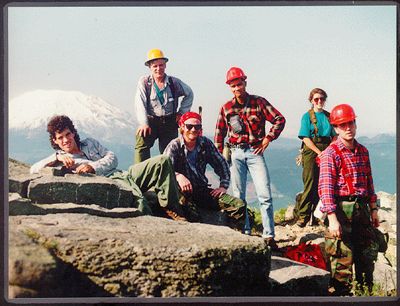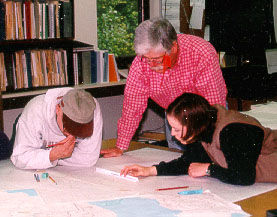 Peter
Schiess is Professor of Forest Engineering in the Management and Engineering
Division. A native of Switzerland, Peter received his Forest Engineering Diploma
from the Swiss Federal Institute of Technology (ETH), Zurich, Switzerland. After
working as a research engineer in soil physics and as Assistant District Forest
Engineer, he came to the UW in 1969, where he did graduate work in micrometeorology
and received his Ph.D. in 1975. In 1977, he was appointed Assistant Professor
in Forest Engineering here in the College.
Peter
Schiess is Professor of Forest Engineering in the Management and Engineering
Division. A native of Switzerland, Peter received his Forest Engineering Diploma
from the Swiss Federal Institute of Technology (ETH), Zurich, Switzerland. After
working as a research engineer in soil physics and as Assistant District Forest
Engineer, he came to the UW in 1969, where he did graduate work in micrometeorology
and received his Ph.D. in 1975. In 1977, he was appointed Assistant Professor
in Forest Engineering here in the College.
Peterís first research interests
centered around small wood harvesting and mechanized operations. One of his
concerns relates to the level of the training wood workers receive in relation
to ever-increasing silvicultural and technological complexities faced in the
woods. In 1994, he helped create the first training center in the U.S. (located
in Forks, WA) dedicated to the training of harvester/forwarder operators.
His current research
interests center around stream - roads interactions and timber harvest planning
as a subset of landscape-level analysis. He is interested in the trade-offs
between environmental and economic concerns as they relate to logging operations,
road locations and haul. For example, he is using GIS methodologies as a tool
for quantification of sediment generation and delivery to streams.
 Other
interests relate to integrative undergraduate education at the senior level.
He has managed the forest engineering curriculumís Field Studies project (now
called the Senior
Capstone Design project) since 1982. Part of the original curriculum since
1910, Field Studies is a quarter-long course taught on-location, off-campus.
The course provides a capstone experience in a professional environment, in
which seniors develop a management and transportation plan for a land base in
cooperation with a forest landowner. The project has gained a new dimension
in light of the on-going shift from a pure timber-production-oriented design
paradigm to one driven by goals for superior land stewardship and environmental
protection of streams and other resources. As such, it plays an important role
in research and development of forest harvest and design methods and tools.
Other
interests relate to integrative undergraduate education at the senior level.
He has managed the forest engineering curriculumís Field Studies project (now
called the Senior
Capstone Design project) since 1982. Part of the original curriculum since
1910, Field Studies is a quarter-long course taught on-location, off-campus.
The course provides a capstone experience in a professional environment, in
which seniors develop a management and transportation plan for a land base in
cooperation with a forest landowner. The project has gained a new dimension
in light of the on-going shift from a pure timber-production-oriented design
paradigm to one driven by goals for superior land stewardship and environmental
protection of streams and other resources. As such, it plays an important role
in research and development of forest harvest and design methods and tools.
 In
June 1999, Peter was appointed to the McMc Resources Endowed Professorship in
Forest Engineering. He explains, "This honor allows me to work on an expanded
model in integrative teaching, which hopefully will span the full senior year
across curricula and culminate in a capstone design course. True integrative
teaching and learning cannot be done Ďat the last minuteí in the last quarter
of a studentís career; it ideally starts at least at the beginning of the senior
year. The basis for such an approach is the creation of a common thematic thread
through upper-division classes in an immersed learning environment culminating
in a multi-disciplinary capstone design course."
In
June 1999, Peter was appointed to the McMc Resources Endowed Professorship in
Forest Engineering. He explains, "This honor allows me to work on an expanded
model in integrative teaching, which hopefully will span the full senior year
across curricula and culminate in a capstone design course. True integrative
teaching and learning cannot be done Ďat the last minuteí in the last quarter
of a studentís career; it ideally starts at least at the beginning of the senior
year. The basis for such an approach is the creation of a common thematic thread
through upper-division classes in an immersed learning environment culminating
in a multi-disciplinary capstone design course."
 Peter
Schiess is Professor of Forest Engineering in the Management and Engineering
Division. A native of Switzerland, Peter received his Forest Engineering Diploma
from the Swiss Federal Institute of Technology (ETH), Zurich, Switzerland. After
working as a research engineer in soil physics and as Assistant District Forest
Engineer, he came to the UW in 1969, where he did graduate work in micrometeorology
and received his Ph.D. in 1975. In 1977, he was appointed Assistant Professor
in Forest Engineering here in the College.
Peter
Schiess is Professor of Forest Engineering in the Management and Engineering
Division. A native of Switzerland, Peter received his Forest Engineering Diploma
from the Swiss Federal Institute of Technology (ETH), Zurich, Switzerland. After
working as a research engineer in soil physics and as Assistant District Forest
Engineer, he came to the UW in 1969, where he did graduate work in micrometeorology
and received his Ph.D. in 1975. In 1977, he was appointed Assistant Professor
in Forest Engineering here in the College. Other
interests relate to integrative undergraduate education at the senior level.
He has managed the forest engineering curriculumís Field Studies project (now
called the
Other
interests relate to integrative undergraduate education at the senior level.
He has managed the forest engineering curriculumís Field Studies project (now
called the  In
June 1999, Peter was appointed to the McMc Resources Endowed Professorship in
Forest Engineering. He explains, "This honor allows me to work on an expanded
model in integrative teaching, which hopefully will span the full senior year
across curricula and culminate in a capstone design course. True integrative
teaching and learning cannot be done Ďat the last minuteí in the last quarter
of a studentís career; it ideally starts at least at the beginning of the senior
year. The basis for such an approach is the creation of a common thematic thread
through upper-division classes in an immersed learning environment culminating
in a multi-disciplinary capstone design course."
In
June 1999, Peter was appointed to the McMc Resources Endowed Professorship in
Forest Engineering. He explains, "This honor allows me to work on an expanded
model in integrative teaching, which hopefully will span the full senior year
across curricula and culminate in a capstone design course. True integrative
teaching and learning cannot be done Ďat the last minuteí in the last quarter
of a studentís career; it ideally starts at least at the beginning of the senior
year. The basis for such an approach is the creation of a common thematic thread
through upper-division classes in an immersed learning environment culminating
in a multi-disciplinary capstone design course."